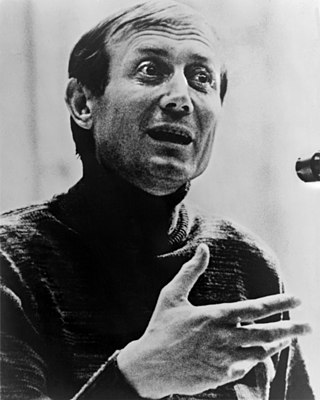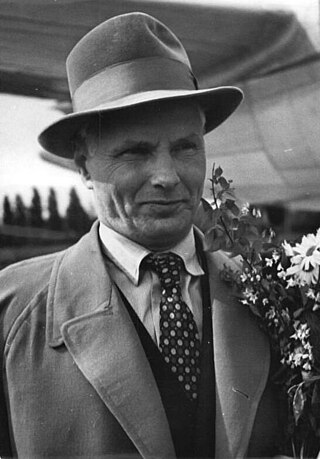
Czesław Miłosz was a Polish-American poet, prose writer, translator, and diplomat. Regarded as one of the great poets of the 20th century, he won the 1980 Nobel Prize in Literature. In its citation, the Swedish Academy called Miłosz a writer who "voices man's exposed condition in a world of severe conflicts".

Polish literature is the literary tradition of Poland. Most Polish literature has been written in the Polish language, though other languages used in Poland over the centuries have also contributed to Polish literary traditions, including Latin, Yiddish, Lithuanian, Russian, German and Esperanto. According to Czesław Miłosz, for centuries Polish literature focused more on drama and poetic self-expression than on fiction. The reasons were manifold but mostly rested on the historical circumstances of the nation. Polish writers typically have had a more profound range of choices to motivate them to write, including past cataclysms of extraordinary violence that swept Poland, but also, Poland's collective incongruities demanding an adequate reaction from the writing communities of any given period.

Yevgeny Aleksandrovich Yevtushenko was a Soviet and Russian poet. He was also a novelist, essayist, dramatist, screenwriter, publisher, actor, editor, university professor, and director of several films.

Robert L. Hass is an American poet. He served as Poet Laureate of the United States from 1995 to 1997. He won the 2007 National Book Award and shared the 2008 Pulitzer Prize for the collection Time and Materials: Poems 1997–2005. In 2014 he was awarded the Wallace Stevens Award from the Academy of American Poets.

Tomas Venclova is a Lithuanian poet, prose writer, scholar, philologist and translator of literature. He is one of the five founding members of the Lithuanian Helsinki Group. In 1977, following his dissident activities, he was forced to emigrate and was deprived of his Soviet citizenship. Since 1980, he has taught Russian and Polish literature at Yale University. Considered a major figure in world literature, he has received many awards, including the Prize of Two Nations, and The Person of Tolerance of the Year Award from the Sugihara Foundation, among other honors.

Andrei Andreyevich Voznesensky was a Soviet and Russian poet and writer who had been referred to by Robert Lowell as "one of the greatest living poets in any language." He was one of the "Children of the '60s," a new wave of iconic Russian intellectuals led by the Khrushchev Thaw.

Izabella Akhatovna Akhmadulina was a Soviet and Russian poet, short story writer, and translator, known for her apolitical writing stance. She was part of the Russian New Wave literary movement. She was cited by Joseph Brodsky as the best living poet in the Russian language. She is known in Russia as "the voice of the epoch".

Robert Ivanovich Rozhdestvensky was a Soviet-Russian poet and Songwriter who broke with socialist realism in the 1950s–1960s during the Khrushchev Thaw and, along with such poets as Andrey Voznesensky, Yevgeny Yevtushenko, and Bella Akhmadulina, pioneered a newer, fresher, and freer style of poetry in the Soviet Union.


Oscar Vladislas de Lubicz Milosz was a Lithuanian French language poet, playwright, novelist, essayist and representative of Lithuania at the League of Nations. His literary career began at the end of the nineteenth century during la Belle Époque and reached its high point in the mid-1920s with the books Ars Magna and Les Arcanes, in which he developed a highly personal and dense Christian cosmogony comparable to that of Dante in The Divine Comedy and John Milton in Paradise Lost. A solitary and unique twentieth-century metaphysician, his poems are visionary and often tormented. He was a distant cousin of Polish writer Czesław Miłosz, winner of the Nobel Prize for literature in 1980.
Nationality words link to articles with information on the nation's poetry or literature.

Dr. K. Ayyappa Paniker, sometimes spelt "Ayyappa Panicker", was a Malayalam poet, literary critic, and an academic and a scholar in modern and post-modern literary theories as well as ancient Indian aesthetics and literary traditions. He was one of the pioneers of modernism in Malayalam poetry, where his seminal works like Kurukshethram (1960), is considered a turning point in Malayalam poetry. Many of Ayyappa Paniker's poems and his several essays were an important influence on later generations of Malayalam writers.

The Maxim Gorky Literature Institute is an institution of higher education in Moscow. It is located at 25 Tverskoy Boulevard in central Moscow.
Berkeley Poetry Review (BPR) is an American poetry journal published annually by the undergraduate students at the University of California, Berkeley since 1974.

The Kelly Writers House is a mixed-use programming and community space on the campus of the University of Pennsylvania in Philadelphia.
River Styx is a literary journal produced in St. Louis, Missouri, and published two times a year by the Big River Association. It is the oldest literary journal in St. Louis, Missouri.

Stepan Petrovich Schipachev was a Russian Soviet poet. He is best known for the poem Lines of Love and poetry collections Musings (1962), A Man's Hand (1964), and Selected Works (1965).
A Treatise on Poetry is book-length poem in Polish by Nobel Prize-winning poet Czesław Miłosz on Polish literature, poetry and history from 1900 to 1949. Written in 1955 and 1956, it was first published in book form in 1957 and won that year's literary prize from Kultura. The Treatise is considered one of Miłosz's greatest works.
Yunost is a Russian language literary magazine created in 1955 in Moscow by Valentin Kataev, its first editor-in-chief, who was fired in 1961 for publishing Vasily Aksyonov's Ticket to the Stars. In Yunost, which appealed to the young intellectual readership and contained an impressive poetry section, were premiered some significant, occasionally controversial works of Anna Akhmatova, Bella Akhmadulina, Bulat Okudzhava, Nikolay Rubtsov, Yevgeny Yevtushenko, Andrey Voznesensky, Robert Rozhdestvensky, Boris Vasilyev, Andrei Molchanov, Rimma Kazakova, Mikhail Zadornov, Fazil Iskander, Vasily Aksyonov, Anatoly Gladilin, Anatoly Kuznetsov, Grigory Gorin, Nikolay Leonov and others. Since 1991 Yunost is an independently published journal.
The International Poetry Forum (IPF) is a nonprofit organization founded in 1966 by Samuel John Hazo. The IPF has hosted poetry readings by over 800 poets and performers at the Carnegie Lecture Hall, Heinz Hall, and other public venues in Pittsburgh, PA. The organization has also presented a series of “road shows” at venues like the Smithsonian Institution in Washington, D.C. Hazo's original vision for the Forum was to promote the art of spoken poetry and to create a space where “poetry could speak for itself in a public setting.”














